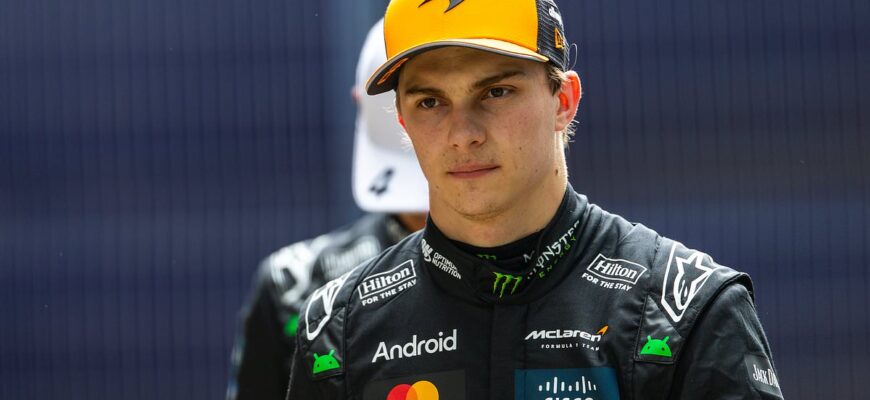The British Grand Prix at Silverstone delivered its usual blend of drama, but for McLaren driver Oscar Piastri, the dominant emotion was one of frustration. What appeared to be a potential breakthrough victory was ultimately snatched away by a 10-second penalty, igniting fresh debate about the application of Formula 1`s often inscrutable regulations and the consistency of officiating decisions.
The Incident Under Scrutiny
The pivotal moment occurred behind the Safety Car during a crucial restart. Following a prolonged period under caution, drivers faced the challenge of managing tire and brake temperatures. Piastri, leading the pack, executed a technique common in such situations: a firm application of the brakes to generate heat in the carbon discs. This action coincided precisely with the Safety Car extinguishing its lights – a signal that the race was about to resume.
The sudden deceleration caught the car behind, Max Verstappen, by surprise. Despite the Red Bull momentarily pulling alongside the McLaren, Verstappen immediately yielded the position back, correctly following the protocol for overtaking under Safety Car conditions. While attention might initially have focused on Verstappen`s brief breach, the stewards turned their gaze forward, deeming Piastri`s braking maneuver the instigating issue.
The Rationale Behind the Ruling
The stewards, armed with telemetry data from Piastri`s car, concluded that his actions constituted “erratic driving” under Article 55.15 of the FIA Sporting Regulations. Their analysis revealed a significant and sudden drop in speed – from 218 kph (135 mph) down to a mere 52 kph (32 mph) – attributed to a peak brake pressure of 59.2 psi. This, they determined, endangered other drivers by causing an unexpected and severe concertina effect.
The rule exists for a sensible reason: to prevent unpredictable actions by the lead driver from triggering accidents down the field as cars bunch up while trying to anticipate the restart. Under a strict interpretation, Piastri`s recorded telemetry certainly painted a picture of drastic deceleration.
A Question of Consistency
Predictably, the decision immediately drew comparisons to a remarkably similar incident earlier in the season involving George Russell and Sergio Pérez at the Canadian Grand Prix. In Montreal, Russell was accused of erratic driving behind the Safety Car, but a protest by Red Bull was dismissed.
Both Piastri and Red Bull team figures questioned the disparity. Max Verstappen noted, “I just find it strange that suddenly now Oscar is the first one to receive 10 seconds for it.” Red Bull principal Christian Horner went further, stating, “I wasn`t surprised to see [Piastri] get a penalty. That was what you would expect. It was probably more surprising that George didn`t get one in Montreal, to be honest with you.”
However, the stewards` reports highlighted technical differences they considered significant. Russell`s brake pressure in Canada was measured at 30 psi (roughly half of Piastri`s), and his speed reduction was approximately 40 mph compared to Piastri`s 100 mph. These variances, coupled with different track conditions and the specific timing relative to the Safety Car`s lights going out, formed the basis for the stewards concluding the cases were distinct.
Piastri, understandably, remained confused, particularly challenging the notion that Verstappen had to take significant “evasive action.” He felt the incident was less severe than the one in Canada, making the penalty harder to swallow.
Piastri`s Frustration and Team Dynamics
For Piastri, who had driven a strong race and felt he had done everything right up to that point, the penalty was a bitter pill. Despite his reputation for calmness, his frustration was palpable, though carefully managed in media appearances.
“It obviously hurts at the moment,” he stated. “It`s a different hurt, though, because I know I deserved a lot more than what I got today… Ultimately when you don`t get the result you think you deserve, it hurts. Especially when it`s not in your control.”
The penalty resulted in Piastri dropping behind teammate Lando Norris after their final pit stops. In a brief moment of hope, Piastri asked the team if they could swap positions, a request he himself admitted was unlikely to be granted. McLaren Team Principal Andrea Stella explained the decision was based on fairness given the penalty`s timing during the transition to dry tires, ensuring the natural order post-penalty was maintained.
While acknowledging the severity of the penalty (“very harsh”), Stella defended Piastri`s actions, suggesting the late Safety Car pull-in complicated matters and even hinting that “race craft” from competitors might have made the situation appear worse than it was. Ultimately, he accepted the stewards` ruling, emphasizing that the team and driver would learn from it and use the setback as motivation.
The Aftermath
The outcome saw Lando Norris secure a popular home victory, a significant result for him and the team. For Piastri, however, the day ended in disappointment, finishing second with the lingering feeling of what might have been. The incident underscores the razor-thin margins and the potentially race-altering impact of technical interpretations of complex regulations in the world of Formula 1. Whether the consistency concerns raised by drivers and teams will lead to clearer guidelines for Safety Car restarts remains, as ever, a subject for future debate.







